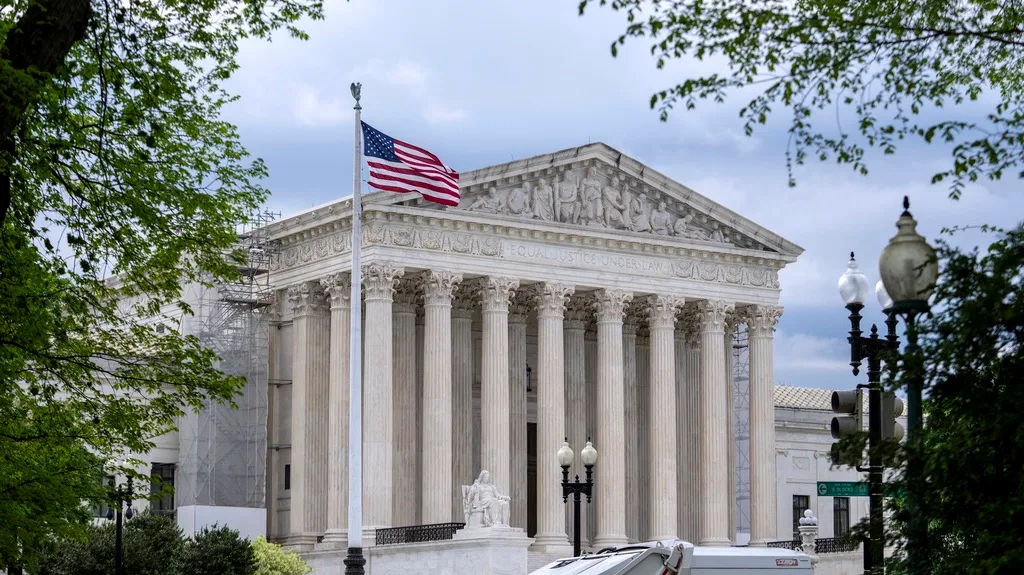March 16, 2013
Briefs in SCOTUS Prop. 8 Hearings Show Partisan Divide on Marriage Equality
Steve Weinstein READ TIME: 3 MIN.
No Democratic attorney general in a state that prohibits same-sex couples from marrying has signed onto a legal filing asking the Supreme Court to uphold California's constitutional ban on gay marriage.
No Republican attorney general is asking the high court to rule in favor of marriage equality.
The Republican leadership in the House of Representatives, supported by 10 GOP senators, is spearheading the defense of the federal law that prevents legally married gay couples from collecting a range of federal benefits otherwise available to married couples.
Some 212 Democrats and independents in Congress want part of the federal Defense of Marriage Act overturned. That includes two dozen who initially voted for it.
A continuing distinct partisan divide is present in the gay marriage cases at the Supreme Court, set for arguments March 26-27, even though a brief on behalf of more than 100 prominent Republicans calls for marriage equality. The split is most apparent in legal briefs filed with the court by state attorneys general.
All 21 attorneys general who have signed legal briefs or letters urging the court to uphold California's ban on same-sex marriage are Republican.
The result of the federal appeals court ruling striking down California's ban, known as Proposition 8, "is disintegration of perhaps the most fundamental and revered cultural institution of American life: marriage as we know it," the Republicans said. The states represented on the briefs mostly are reliably Republican and chose GOP nominee Mitt Romney over President Barack Obama in November.
But also are included are four states won by Obama - Colorado, Michigan, Virginia and Wisconsin.
An additional 14 attorneys general who are asking the court for the opposite outcome are Democrats, including those from the nine states that allow gay couples to wed. Also among those Democrats are California's Kamala Harris and Ellen Rosenblum of Oregon, which has a constitutional prohibition on same-sex weddings. Obama won all 14 states.
Removing barriers and promoting the equality of spouses has strengthened the institution of marriage, the Democratic attorneys general said. "Over the past decade, this evolution has been affirmed as same-sex couples have been permitted to marry. Against that history of greater inclusion and equality, Proposition 8 singles out same-sex couples and excludes them from the opportunity to marry," the Democrats said.
Florida and Ohio are among nine other states that define marriage as the union of a man and a woman in their constitutions, but that are not represented in the Supreme Court debate at all.
Obama won both states in November, but Republicans control the state government. Spokesmen for Florida Attorney General Pam Bondi and Ohio Attorney General Mike DeWine, both Republicans, declined comment.
In the seven other states, a Democrat is attorney general. Mississippi Attorney General Jim Hood wants the court to issue narrow rulings in both cases, spokeswoman Jan Schaefer said. "The outcome of the two cases should not directly impact Mississippi law," Schaefer said.
The participants in the two cases and other interested parties have submitted nearly 200 briefs that range from broad historical overviews to personal stories to technical legal matters.
The Catholic Church, the Southern Baptist Convention, the Mormon church and Orthodox Jewish congregations are among the religious organizations urging the court to uphold the California provision.
Supporters of same-sex marriage include Episcopal bishops in California, the United Church of Christ, and the Reform and Conservative movements in Judaism.
There are testimonials in support of gay marriage from the straight parents and siblings of gays and lesbians, as well as from people who call themselves survivors of efforts to help them change their sexual orientation. On the other side, some members of the ex-gay community defend traditional marriage laws, and some gay and bisexual men say the courts should not be involved in defining marriage.
One group of international scholars and jurists argues that reserving marriage for straight couples, while offering other protections for gay Americans, is consistent with practices in other countries. Experts in foreign law claim that upholding Proposition 8 would diminish the U.S. on the world stage at a time when many other nations also are moving toward marriage equality.
The court is expected to rule in the cases by the end of June.
Steve Weinstein has been a regular correspondent for the International Herald Tribune, the Advocate, the Village Voice and Out. He has been covering the AIDS crisis since the early '80s, when he began his career. He is the author of "The Q Guide to Fire Island" (Alyson, 2007).


